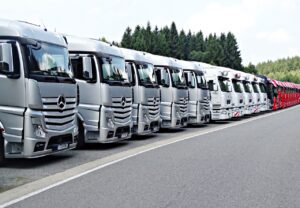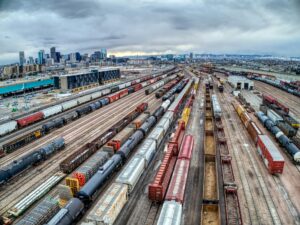Unraveling the complexities of truck driver employment status, pivotal in legal battles like California’s AB5 and the U.S. Department of Labor’s regulations, took center stage at the U.S. Supreme Court. Explore the Bissonnette vs. LePage Bakeries case, shedding light on arbitration agreements and the reach of the Federal Arbitration Act, with implications for transportation workers and independent contractors alike.

If truckers haul bread and cakes, is their business baking or trucking?
The never-ending question of defining the employment status of a truck driver, key to battles over California’s AB5 and the U.S. Department of Labor’s recent independent contractor status regulation, was on display this week at the U.S Supreme Court.
The issue at hand wasn’t specifically whether a driver should be considered an employee or an independent contractor, but the question of the reach of the Federal Arbitration Act and its treatment of transportation workers came very close to that contentious subject.
The court on Tuesday heard arguments in the case of Bissonnette et al. vs. LePage Bakeries et al. The “et al” with Neal Bissonnette is Tyler Wojnarowski. Both were truck drivers who had purchased distribution rights for Flowers Foods.
The three defendants are Flowers Foods (NYSE: FLO), its subsidiary LePage Bakeries and CK Sales, a subsidiary of LePage.
Bissonnette and Wojnarowski distributed products made by Flowers, such as Wonder Bread. Court documents describe the men as “franchisees that each entered into a ‘Distribution Agreement’ with CK Sales, through which they acquired certain distribution rights in exchange for monetary consideration.”
The initial lawsuit filed by Bissonnette and Wojnarowski, according to a document in the appeal of the lower court ruling, was over a claim against Flowers of “unpaid or withheld wages, unpaid overtime wages and unjust enrichment pursuant to the Fair Labor Standards Act and Connecticut wage laws.”
A key issue: Arbitration agreements were signed
There is no dispute over one fact in the case: Bissonnette and Wojnarowski did sign arbitration agreements with Flowers. But the argument of the two men is that the agreements are unenforceable under a loophole in the Federal Arbitration Act, which was adopted in 1925. Flowers argued at the lower court level that arbitration should be pursued given the agreements signed by the two drivers.
The loophole is a provision in the act given to “seamen, railroad employees or any other class of workers engaged in foreign or interstate commerce.” That definition over the years has come to be defined as including other transportation workers.
Those workers could take their disputes to court because of the loophole, whereas other workers who had signed arbitration agreements would need to settle disputes through that process.
In the request for Supreme Court review, attorneys for Bissonnette and Wojnarowski summed up the initial dispute, which touches on the question of defining an independent contractor.
“Having characterized its truck drivers as independent contractors, Flowers decided it could withdraw its own operating expenses from its drivers’ paychecks, charge them for the privilege of working for the company, and decline to pay them overtime — none of which, the plaintiffs allege, is legal,” the request states.
The plaintiffs’ arguments also were that the interstate commerce workers’ inclusion in the language meant that they should be able to take advantage of the loophole given that at the very least some of the products they were delivering originated outside Connecticut, hence they were interstate workers.
In May 2020, the U.S. District Court for the District of Connecticut came down on the side of Flowers and its subsidiaries.
In a decision that turned partly on the definition of worker status, the court concluded that Bissonnette and Wojnarowski were not employees. The two men had “a much broader scope of responsibility that belies the claim that they are only or even principally truck drivers,” Judge Kari Dooley wrote. “Rather, because the Plaintiffs purchase and own the territories comprising their routes, their distribution efforts are the means by which they realize and increase sales and profits”






